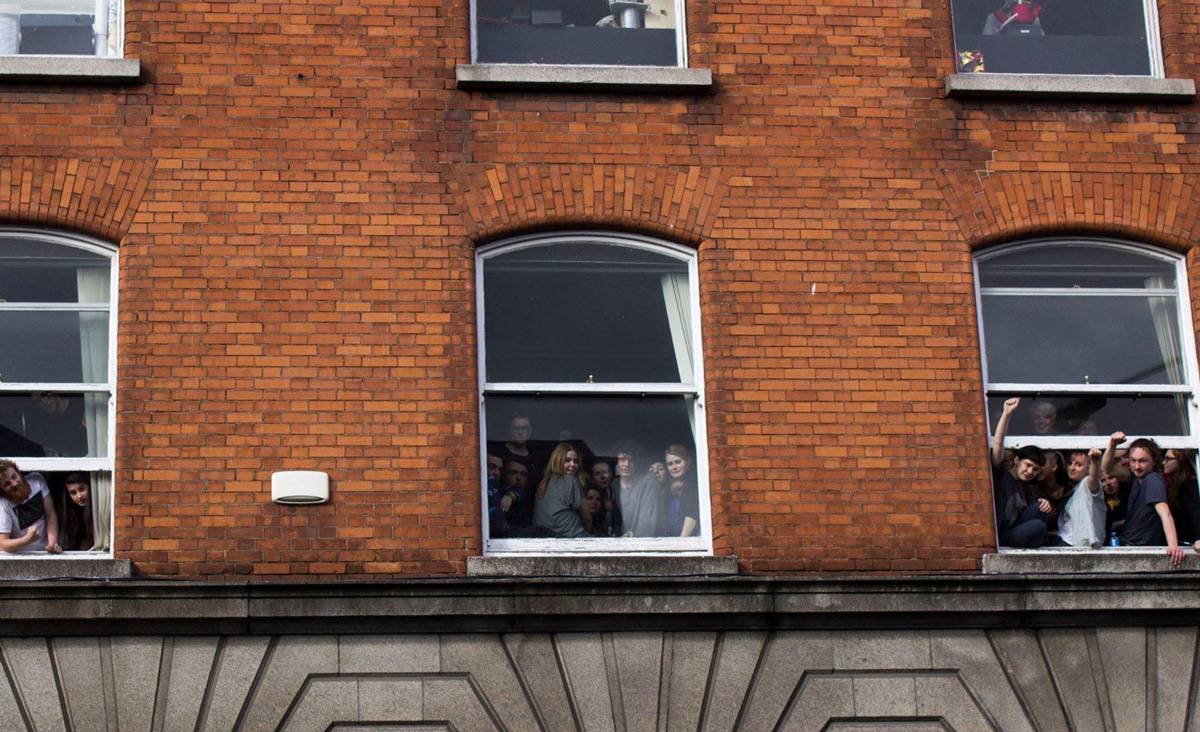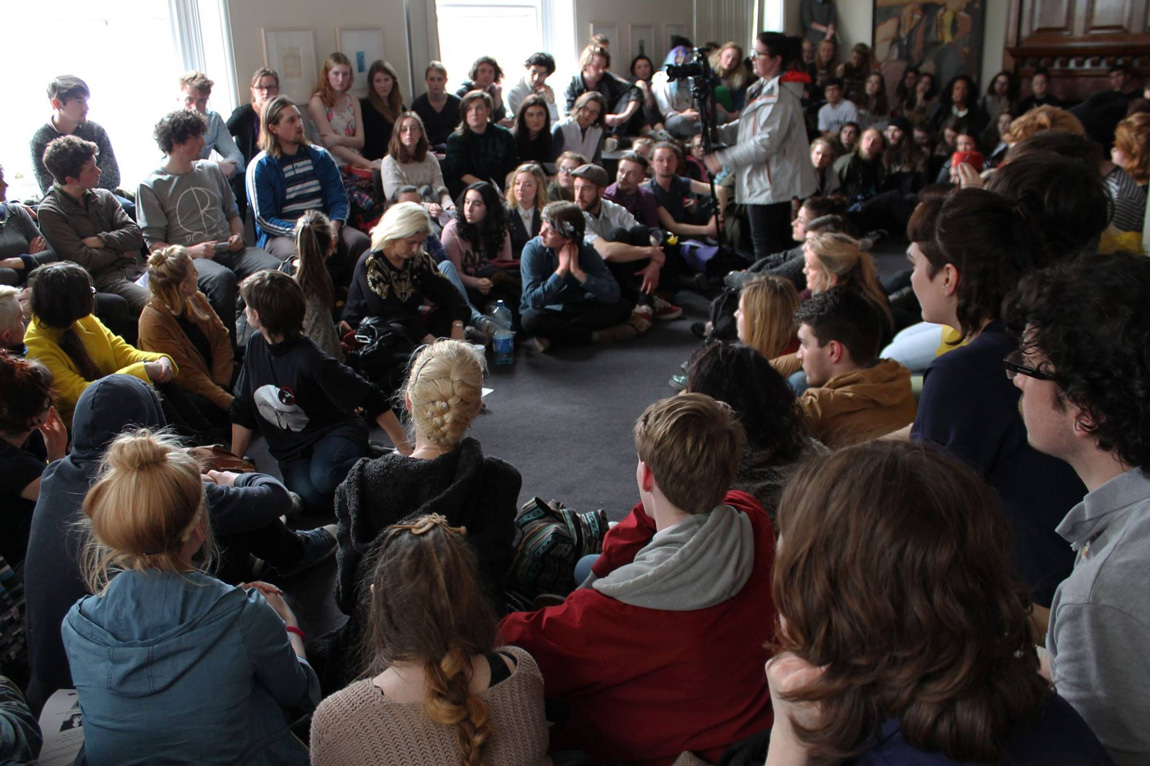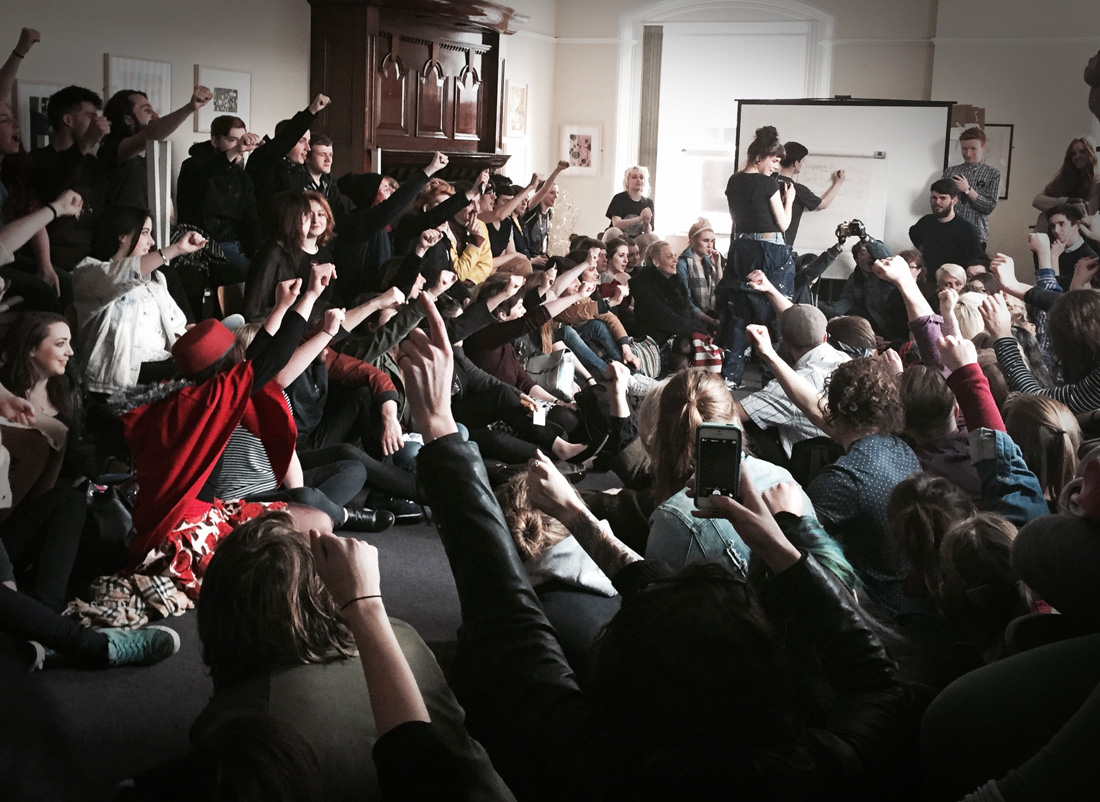A shift in ideology and the resulting student disillusionment has thrown the future of contemporary art in Ireland into a suspended state, following protests of student groups and alumni from the National College of Art and Design (NCAD).
They’ve been left “abandoned” and questioning “the value of their degrees”. The organisers of the protest, who have organised under the name “NCAD Student Action”, wrote a letter with students and alumni addressed to NCAD Director, Professor Declan McGonagle, with a series of demands to be implemented “immediately”. Subsequent actions have seen students occupy both the concourse and the boardroom of NCAD.
Questions about accounting practices, a drastic increase in student numbers, the introduction of student charges, and questionable revenue management have culminated in these scenes of deep-rooted frustration.
On March 17th, the letter to McGonagle was circulated via social media and in print on the NCAD campus the next day. The letter, composed by a group of students and alumni, was to be signed by both students and alumni of the college. The letters were delivered to the director’s office on March 20th, where the list of demands was read to him. According to a press release, 400 students placed a letter on his desk. The letter, which claimed “it has become evident that the administration’s primary concern at present is the management of revenue, rather than the education and welfare of its students”, stated that if the demands of the letter were not met, “we will escalate our campaign throughout and beyond College”.
On March 22nd, the director released a “First Response” to the student body. The director asserted: “NCAD has faced a series of challenges in the recession”, including cuts of over 50 per cent to core funding since 2008 and restrictions on staff recruitment from the state. The students responded to this letter claiming it did not “allay any of our concerns”. While the director responded to the claims made in the letter of demands, the students response was to demand NCAD to “produce the accounts”. According to the Irish Times, NCAD’s accounting practices have been deemed “unfit for purpose” and significant delays have been experienced with the college producing accounts. The college’s annual report for 2009/10 is the last report compiled that is available to view, and NCAD confirmed to The University Times that the audit of accounts for 2012/13 is now underway. McGonagle has stated that the college would be up to date with its accounts audits by summer of 2015.

The director was due to meet with students on Tuesday, March 24th, to address these demands. However, he pulled out of the meeting, notifying students via email. As a result, students staged a sit-in on the college concourse. NCAD Student Action released a memo to students urging them to meet at the concourse, stating: “His withdrawal constitutes a lack of confidence in himself and an outrageous disrespect for students. We consider his decision not to address the student body as an admission of inadequacy on his part regarding the college’s intended management strategy”.
On Tuesday March 24th, students held their first emergency board meeting in the college boardroom, where they were refusing to leave until the director addressed them. The director agreed at that time to address staff with students at 2pm on Wednesday, March 25th, at St. Catherine’s Church. Media was excluded from the meeting in a decision made by college management. However, NCAD Student Action claimed the meeting closed “without progress or resolution”.
The campaign has seen support from college staff. On March 24th, a “Letter in Support of Student Campaign” signed by 40 NCAD staff members stated “we fully support the student concerns” and asserts that “the reputation of the college is endangered by the actions of Senior management”. A similar letter has been circulated by alumni. A number of academics’ names, including those from Trinity College Dublin, Maynooth University, Dublin City University, University of Zurich and the University of Kent, have appeared on a letter expressing “solidarity with the students”. It stated: “We urgently need another model of what higher education might be – one guided by the pursuit of learning rather than the pursuit of profit, driven by radical enquiry rather than bogus metrics”.
On Thursday, the Union of Students in Ireland’s National Congress, made up of delegates from its member unions, passed an emergency motion in solidarity with the movement in NCAD. Proposed by Seán Rooney of DCU Students’ Union, the motion set out to recognise what’s referred to as the financialisation of education across Europe, and NCAD’s place in the wider movement across the continent. Speaking to The University Times just after the motion had passed, Rooney said: “I think that solidarity is always important within the student movement.This motion goes to say that we support the actions of the students in NCAD at this moment in time as they fight against the many issues that they’re currently facing, and their search to get accountability from their university hierarchy.”
He went on to say: “I think that it’s the issues they’re facing on a local level are reflective of many of the things that USI is fighting for on a national level, and for that reason, I thought that the motion was very important.”
A video uploaded on March 20th, which sees students delivering the letters to Professor McGonagle, shows students ask McGonagle to address “damage that this management has done to the education, welfare and financial situation of the people in this room”. The director refused to acknowledge this, claiming that students coming into his office was not the appropriate forum for this kind of discussion: “This is not, intended, clearly, to be a center for debate, en masse presentation in the office and I’m very happy to receive your documents, your opinions are very clear, and they will be responded to.” In response to a specific question about college finances from a student, the director responded: “I’m not having that sort of detailed debate with an en-masse movement coming into the office. I’m quite prepared to sit down with the union … and have a detailed discussion about all the financial issues that the college faces and our response to them … you have articulated this event in a particular way which does not lead to a debate”.
In the director’s first response, dated March 22nd, he states: “We would welcome a strategic ongoing response that address the key issues for the future of the college with positive ideas – through the representative structures that are in place (i.e. class reps and the students’ union) and any new mechanisms that we agree”. An NCAD press statement dated March 24th stated management “has been engaging proactively with the students and the Students’ Union on their concerns about the impact of funding cutbacks. The Director of NCAD has held a number of meetings with the Students’ Union and meets with student groupings on a regular basis.” Speaking to The University Times, however, those behind NCAD Student Action expressed that: “The formats of debate and discussion that Declan McGonagle references (such as class representative meetings) have been unsatisfactory.” The group claims: “There has been years of false promises, ambiguity and top-down miscommunication. Now is not the time for more of such ‘discussion’. NCAD is at breaking point – this is the time for action.”

NCAD Students’ Union (NCADSU), while not spearheading the campaign, have “engaged with these events as both participants and partial organisers.” Speaking to The University Times, NCADSU stated: “It is important to understand in this context, that the students’ union in NCAD is not the just two elected officers but the entire student body. The letter of demands which was signed and handed to the director by 400 students was not written by the students’ union, but arose from a letter sent from the students’ union to NCAD’s chairman of An Bord and later all students.” This letter, seen by The University Times outlined, along with many of the other concerns at the heart of the protests, the “distrust” and “lack of confidence” that NCADSU has in the management of NCAD, as well as the delay that NCADSU had experienced in receiving funding and wages this year. The letter also accused NCAD of a “falsehood in accounting” after the college made a “blatantly false” claim that NCADSU had gone €18,000 over budget. Speaking to The University Times, they further added: “We of course agree with the signed letter handed to the director as a list of issues which need to be dealt with urgently. We stand by, and will continue to stand by the student protests.”
The letter of demands produced by students puts forward nine demands centered around the increasing student numbers and increasing financial burden placed on students of NCAD. The letter states: “It has become evident that the administration’s primary concern at present is the management of revenue, rather than the education and welfare of its students”.
The letter criticises a “reckless” increase in student numbers and the lack of adequate resources put in place to account for this increase. According to NCAD’s website, undergraduate student numbers have increased by 35 per cent since 2011 and NCAD has increased its first-year intake by 75 per cent over the past three years. In his first response, the director asserted that this increase is “in direct response to demand”. However, students have countered that this is not a supply and demand issue. NCAD saw 888 total CAO applicants in 2009, 741 in 2012 and 880 in 2013.
The letter also puts forward demands based around increasing fees placed on students. Students must pay a €100 studio fee and a €100 “materials fee”. Following a request for clarification from The University Times, NCAD Student Action claimed no students they had spoken to felt they receive €100 worth of materials from the college. Students have demanded proof that this money contribute to the relevant costs, or the fee be reversed and students reimbursed the money. A €15 doctors fee was implemented this year “without prior warning” in an “appalling decision”. The director responded, claiming a totally free doctor’s service “was not possible in the context of severe cuts to core funding”. Students have again demanded to see the accounts in order to determine how much of a saving would be made by introducing this cost. Students are demanding that this fee be reversed.
Other demands include a “concrete date” for a new glass furnace, for which several dates were given to students in 2014. The director asserted “it has not yet been possible to secure funding to cover costs involved”. However, students have countered, stating that students who need the furnace pay both €100 levies. An increased fee, from €2850 to €3900, for Masters in Fine Art and Masters in Art in the Digital World has seen three out of seven students drop out this year. Speaking to The University Times, NCAD stated that the increased fees for these courses were “indicated in the 2013/14 and 2014/15 information on those courses online and in hard copy information”. 2016 is to see two years graduate simultaneously due to a change in course structure from a four-year undergraduate degree to a three-year undergraduate and two-year masters degree, meaning that twice the number of students will be presenting their work at the annual graduate exhibition. Students have demanded that adequate plans for the exhibition be evidenced before the end of term. While the director has claimed discussions between students and staff regarding the 2016 exhibition have “been taking place since mid-February 2015” students have responded, asserting these issues should have been fixed when the changes in course structures were first discussed. Commenting to The University Times, NCAD Student Action claimed: “The Graduate Exhibition is the pinnacle of an art and design college qualification. No resolute provisions have been put in place for this drastic increase in participating students.”
Other demands center around the move of the registrar’s office from the administration floor into student space, and the delays to funding and wages for NCADSU.
Speaking to The University Times about the future of their campaign, and their plans to reach out to other colleges, NCAD Student Action stated: “We’re going to continue our campaign until our demands are met. I would encourage anyone who sees the same reductions and failings in their college or place of work to enact their right to protest and do so until they see change.”
Edmund Heaphy contributed reporting to this piece.
Photo by Laura Colgan for DCU’s The College View







